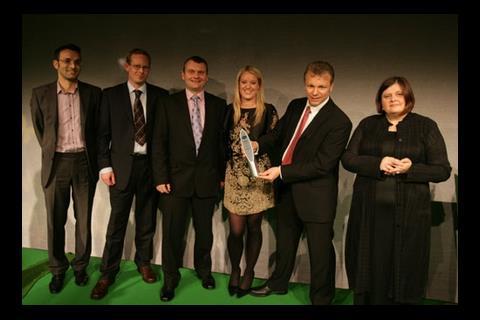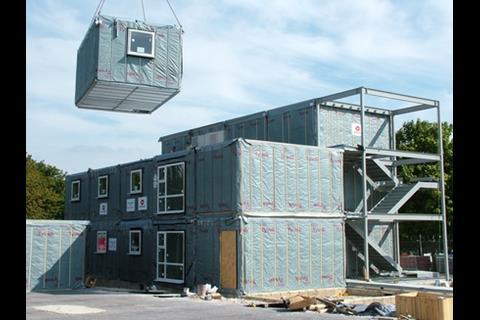Winner
Aspire Defence Capital Works – Project Allenby/Connaught
The strength of the Aspire scheme in embracing sustainability in its fullest sense led to the team winning its second award this year. This 10-year construction project is the largest PFI contract ever awarded by the Ministry of Defence as it looks to improve the quality if life for one third of the UK-based Army.The £8bn project is being delivered by Aspire Defence, a joint venture between Carillion and KBR to demolish 400 buildings, construct 365 new buildings and carry out 140 refurbishments.
A solution to achieving efficient construction with generic designs has been the adoption of modular construction for the accommodation buildings. Ready made insulated bedsit modules are delivered to the site complete with en-suite shower room pods, carpets and fittings. They are then bolted into place within a steel frame and external brick cladding.
97% of demolition waste is recycled and re-used to provide high-grade aggregate for internal roads. A total of 583 kWe of individual micro-CHP systems are being installed in over 100 new accommodation buildings. This is anticipated to save 1,081 tonnes of CO2 each year. 344 tonnes of CO2 are expected to be saved through 30.45 m2 solar thermal water heating systems in 86 new accommodation buildings.
This is not just a work premise: it is a green and pleasant community in which to live and work in.
Runners-up
Atkins and Faber Maunsell – Northumbria University
Newcastle’s Warner Brother Cinema will live on in the form of Northumbria University’s Law, Business and Design School buildings albeit in a more innovative and futuristic external design.Atkins and Faber Maunsell took on the challenge of creating a sustainable learning environment and they did so by using 95% of the rubble from former cinema which was on the site previously.
The £47m project features eye-catching outer stainless steel mesh panels, supported on a galvanised steel ‘low strung’ support structure to shad the building against 50% of the sun’s radiation. This ‘solar veil’ reduces the reliance on air conditioning without adversely impacting on internal lighting.
A solar tube hot water system heats hand washing water, while rainwater from the roof is used for the flushing of WCs. High efficiency condensing boilers, a feature light well and the use of Kalwall external wall are other visually gripping technologies incorporated in the project. Waste construction materials were returned to suppliers for reprocessing, and where possible, unused materials were sold back to suppliers or donated to local suppliers.
Faber Maunsell – Turin Olympics
The United Nations Environmental Programme billed the Turin 2006 Winter Olympics as the ‘greenest games ever’ and Faber Maunsell can take some of that credit after building the media and athletics village for the games.Their brief was simple but challenging – to be carbon neutral. So on the site of an old fruit and vegetable market, work begun on refurbishing and building an Olympic village to house 1200 athletes and 1300 journalists, complete with accommodation, administration centre, health facilities and a sports and leisure complex.
The project boasts maximum use of heat recovery in ventilation systems with high levels of thermal insulation and low infiltration. Existing materials have been recycled in the paving and landscaping of the site, while extensive tree plants and green roof construction increase biodiversity.
The legacy of the games lives on with buildings being turned into residential and commercial accommodation and facilities opening to the public.
Sponsor
A leading international firm of multi-disciplinary consulting engineers, delivering fully integrated design of building services, infrastructure, building design and built fabric solutions ensuring minimal environmental impact.At the forefront of controlled innovation and risk management, we research and identify suitable technologies and companies, enabling us to provide high quality and exemplar designs promoting added value for our clients.
Our objective is to facilitate the ongoing development of the built environment in a way that is compatible with comfort, cost efficiency and low carbon emissions. Our approach to sustainability is through the application of integrated engineering design to determine the optimum solution for each of our clients’ particular needs. Our certified low carbon consultants provide expert guidance in a time of change and uncertainty.
Sustainability Awards 2007
- 1
- 2
- 3
- 4
- 5
- 6
- 7
- 8
- 9
- 10
- 11
- 12
- 13
- 14
- 15Currently reading
Sustainable Development of the Year
- 16
- 17



























